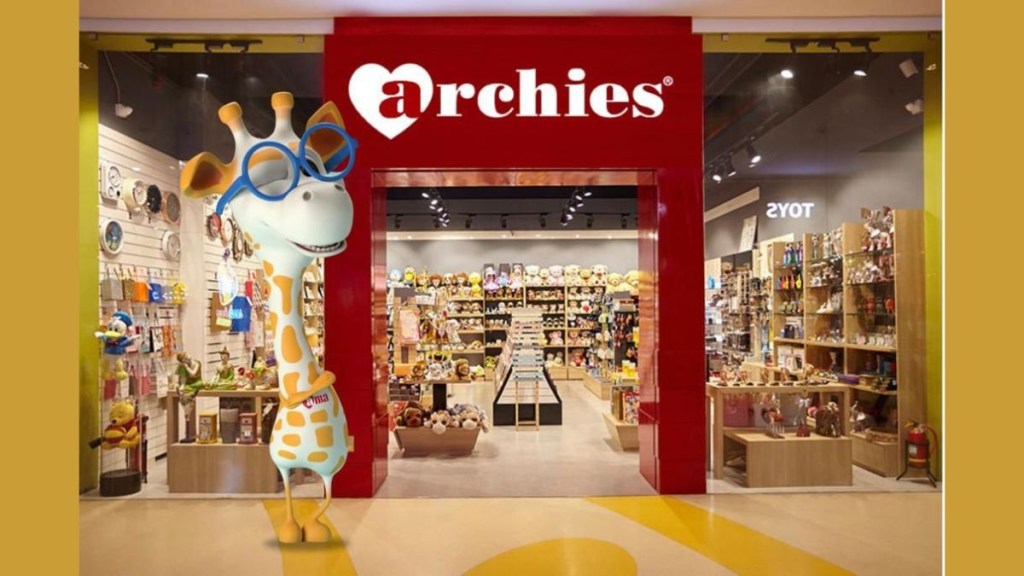Archies, the 44-year-old legacy gift store chain known for a variety of greeting cards and plush toys, is turning over a new page with the introduction of its new mascot, Ama the giraffe, and an innovative collection of merchandise. The brand says it is looking to establish a rapport with youngsters, particularly those aged four to ten, as well as Gen Z teenagers, with the aim to nurture lasting customer relationships.
“While we have customers from varying age groups, many who have been frequenting our stores since they were 15-20 are now in their 40s. There is a nostalgia factor that exists for them, which is why they connect with us. However, this connection is hard to find with younger millennials, Gen Z, and children aged between four and 10. They are missing from our customer base and we are putting in efforts to establish a relationship with them. We don’t want Archies to be a Greek term for them,” said Varun Moolchandani, executive director, Archies.
Alongside, the brand has embarked on an extensive marketing campaign that will run till Valentine’s Day next year. It involves aggressive social media marketing, offline promotion in the form of special offers during festivals, customised merchandise, and Ama-themed products. The company also plans to collaborate with television channels to animate Ama, the mascot, thereby creating a captivating cartoon series for children to enjoy.
Can Archies rekindle the bond with consumers that was forged in a 100% physical world?
Back to the future
The retail chain, part of the Rs 250,000-crore Indian gifting industry (of which 60% is online and 40% offline, growing at a CAGR of about 12%), has crossed Rs 100 crore in revenue last year. However, it is still reeling from the effects of the pandemic, which caused over 75-80 store closures, leading to a reduced 150 shops across the country. “We are focusing on growing in North India, with an aim to establish between 25 and 30 new stores by March next year. Apart from that, we will start selling Archies-branded products in the Middle East as well,” Moolchandani said.
While Archies remains optimistic about its future in an increasingly digital world, industry experts sound a note of caution. Lloyd Mathias, independent
director and former HP Asia marketing head, says, “The attempt is in the right direction, but I am not sure how productive it will be, given how youngsters, who formed the brand’s core base in the past, are mostly present in digital-only spaces. The company must think of itself as digital-first, and then have the stores to support it, like physical anchors.”
The thing is, greeting cards and knick-knacks are low margin items and it doesn’t make economic sense to have a large chain of stores — as Archies used to have at one point — for these when overheads can be kept in check in marketplace pop-ups and virtual stores. In such a scenario analysts advise brands like Archies to embrace the virtual shift. On its part, the brand says it has established its presence in the online world through a dedicated website. It is also present on platforms such as Amazon and Flipkart. It recently entered the quick commerce space by providing 10-minute delivery on Blinkit and plans to join similar platforms soon.
Will all that be enough to regain the recall and market share it enjoyed before the internet pulled the rug from under its feet? KV Sridhar, founder & CCO, Hyper Collective, asserts that only unveiling a mascot and marketing it extensively will not turn the fortunes of the chain. “You have to create an ecosystem in this age of Marvel superheroes, Disney and Pixar. That is a very expensive and difficult process. It is hard to create a character and then have it endorse you, as Amul has done. It is a long-time investment, and you have to make it selflessly,” he said.
Nisha Sampath, managing partner at Bright Angles Consulting, says the bright spot in all this is the new appreciation for in-person and personalised gift shopping since the end of the pandemic. The brand can leverage this sentiment by upgrading its retail experience, she says.
To make itself more relevant and do that as fast as possible, the brand must offer more opportunities for customisation and try and extend beyond products into services such as party planning, experts suggest. Samit Sinha, founder and managing partner, Alchemist Brand Consulting, adds, “There is still a market for physical greeting cards and gifts that will never cease to exist. As a rough parallel, Kindle has neither killed all physical bookstores, nor physical books. We can expect the same here.”
